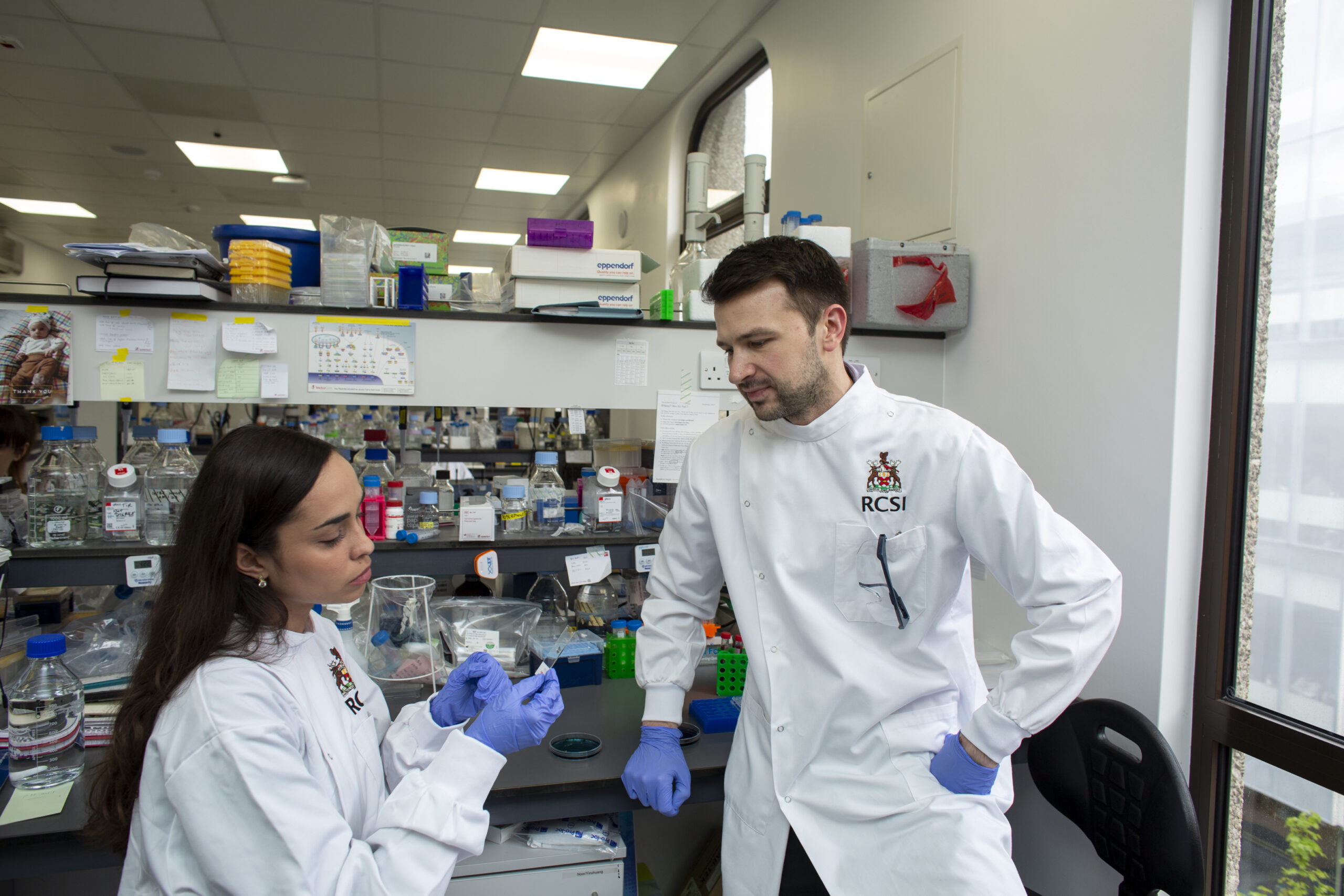Research ProgrammesNavigation

The Beaumont RCSI Cancer Centre has a strong reputation in clinical and translational research, the university’s field-weighted citation impact is the highest in Ireland. The mission of the Cancer Centre is to provide innovative evidence-based care to our cancer patients. Our strategy is to undertake patient centric research to cement our international standing in systems medicine, imaging and integrative genomics. Research programmes are based on disease area and are underpinned by our clinical trials and translational research platforms. The Cancer Centre has ten Research Programmes; Blood Cancers, Breast Cancer, Endocrine Related Cancer, Epidemiology and Pan Cancer, Gastrointestinal Cancer, Gynaecological and Urological Cancer, Head and Neck Cancer, Lung Cancer, Neuro-Oncology and Radiation Oncology.
-
BLOOD CANCERS
Beaumont RCSI Cancer researchers are active members of Blood Cancer Network Ireland (BCNI), which is a collaborative network of clinicians, scientists and population health experts providing blood cancer patients with access to novel early phase clinical trials. Our research focus is on identifying improved treatments for Multiple Myeloma and Chronic lymphocytic leukaemia.
-
BREAST CANCER
The breast cancer research group brings together clinical, epidemiological, statistical, bioinformatics, molecular biology and translational bench-to-bedside expertise. The investigator led research teams have key broad research themes including: Understanding molecular determinants of therapy resistance and metastatic progression in luminal breast cancers; overcoming tyrosine kinase inhibitor resistance mechanisms in HER2 positive breast cancer, exploring the contribution of altered epithelial cell-cell and cell-matrix adhesion in cancer progression and investigating protein signalling networks associated with disease progression. Current clinical trials are focussing on novel targeted therapies in ER positive, HER2 positive and triple negative disease
-
ENDOCRINE-RELATED CANCER
Beaumont Hospital is a tertiary centre for adrenal tumours in Ireland, with expertise in endocrinology, adrenal surgery and oncology. Beaumont Hospital is a member of the European Network for Adrenal Tumours (ENSAT), the lead of the Endocrine Rare Disease Network (ERN) and the national lead for pituitary service. Our clinical researchers actively collaborate with our translational scientists and work to incorporate our research findings into our clinical practice.
-
EPIDEMIOLOGY AND PAN- CANCER
The group are investigating the psychological, social, physical and economic issues associated cancer, beyond the diagnosis and treatment phases
Clinical trials on therapeutic regimes across several cancer types.
-
GASTROINTESTINAL CANCER (UPPER AND LOWER GI)
The gastrointestinal cancer research group utilises bioinformatics, systems biology and machine learning approaches to develop new prognostic tools for the treatment of colorectal cancer (CRC). We explore why certain subgroups of CRC tumours become addicted to inhibitor-of-apoptosis (IAP) proteins, thereby suppressing both apoptosis and immune signalling, and how such subgroups can be effectively treated by novel IAP-targeted therapeutic drugs. Centre Investigators are also searching ways to classify patients with a specific type of colorectal cancer and to develop better treatments for them using clinical, multi-omic and translational approaches. A major focus of current clinical trials is the use of immune therapy in cancers of the upper gastro-intestinal tract.
-
GYNAECOLOGICAL AND UROLOGICAL CANCER
Researchers are using both mutation profiling and proteomic reverse phase protein array platform to understand and treat aberrant kinase signalling in gynaecological cancers. We are interested in genes that alter tumour response to anti-cancer agents. One such target under investigation is the anti-angiogenic protein FKBPL in ovarian cancer. Based on the robust efficacy and excellent safety profile, ALM201, a ‘first-in-class’ FKBPL-based anti-angiogenic therapeutic peptide was granted Orphan Drug Designation by the U.S. Food and Drug Administration (FDA) in the treatment of ovarian cancer. Clinical trials are currently focusing on the role of immunotherapy in prostate cancer
-
HEAD AND NECK SURGICAL ONCOLOGY
The group has a focus on anaplastic thyroid cancer and evaluates the outcomes of patients with anaplastic thyroid cancer. Clinical trials are focussing on interventions in patients undergoing surgery in cancers of the upper gastro-intestinal tract and breast as well as novel therapies in head and neck cancer. In 2020 a interventional trial in Head and Neck cancer was opened.
-
LUNG CANCER
The lung cancer research group are working to understand the mechanisms which underpin the development of immune-related toxicities through the comprehensive analysis of collected biospecimens and clinical data.
Pre-clinical and translational investigator led research groups are taking an omics-based approach to investigating protein interaction networks dysregulated with disease progression. Kinase signalling pathways including EGFR and PI3Kinase/AKT/mTOR are of particular interest in defining new bio-markers to characterise disease. New clinical trials will focus on novel targeted therapies in non-small cell lung cancer as well optimising the role of immunotherapy.
-
NEURO-ONCOLOGY
Investigators lead the GLIOTRAIN consortium which aims to identify novel therapeutic strategies for application in glioblastoma (GBM), while implementing state of the art next generation sequencing, systems medicine and integrative multi-omics to unravel disease resistance mechanisms. Researchers also study apoptotic cell death in the death-resistant phenotype of GBM. This research extends into molecular biomarkers and in particular APOPTO-CELL modelling environment as a superior predictor of treatment responsiveness in newly diagnosed and recurrent GBM patients.
Researchers in the Cancer Centre have successfully conducted the first clinical trials in Ireland of novel therapies for patients with GBM.
-
RADIATION ONCOLOGY
The research teams in the Cancer Clinical Trials Unit and SLRON have developed a strong collaboration for trials involving both radiotherapy and novel therapies. The group focus on RNA and single cell RNA sequencing of matched primary and metastatic tumour biology to determine predictive markers of response to radiotherapy.

